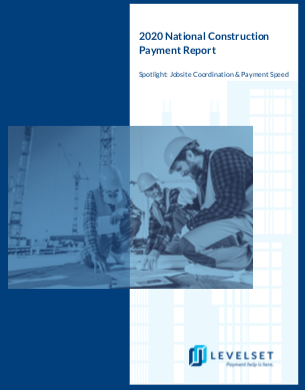
In theory, a construction project follows a tried-and-true process: Estimate a job, win the bid, do the work correctly, keep up with paperwork, get paid – all on schedule and under budget. Unfortunately, a construction job isn’t nearly that simple or straightforward. In their responses to an industry survey conducted in Q1 of 2020, over 540 construction businesses reveal just how damaged that process is. The 2020 National Construction Payment Report: Spring Spotlight on Jobsite Coordination shows just how the construction industry has grown to accept a status quo that’s far from ideal, from coordinating work on the jobsite to chasing down slow payment.
Twice a year, Levelset collects data from hundreds of contractors to keep a pulse on the state of payments in the construction industry. Through February and March of 2020, we teamed up with Fieldwire to collect data on jobsite efficiency and payments. This survey measured the types of construction companies participating, their performance in coordinating and completing work in the field, and how quickly they get paid for their work.
Key takeaways
- Overall, the construction industry accepts project & payment delays as the status quo.
- 3 out of 4 construction businesses (77%) say they are happy with how quickly they finish a job, and a majority (53%) are happy with how quickly they get paid for their work.
- In reality, fewer than 1 in 3 contractors (30%) finish projects on time and within budget.
- 70% say poor jobsite coordination almost always causes projects to run over budget or past deadlines.
- 80% of companies say they spend a significant portion of their workweek chasing down payments.
- Only half of construction businesses say they receive payment within 30 days of invoicing (15% regularly wait for 60 days or longer to get paid).
Contractors are satisfied with how fast they complete work and get paid
When asked to rate the productivity of their field work, contractors are largely content with the status quo. More than 3 in 4 construction businesses (77%) say they are “happy” with how quickly they get the job done.
Similarly, when it comes to getting paid for their work, a majority of construction companies say they are satisfied. Just over half (53%) of all respondents report being happy with how quickly they receive payment for their work.
However, as the survey questions dug deeper, the responses painted a different picture. In reality, poor jobsite coordination, budget overruns, and slow payments are wasting time, delaying projects, and bleeding cash from contractors’ pockets.
In reality, construction suffers from poor job planning and slow payment
By and large, construction businesses say they’re satisfied with their jobsite planning and productivity. At the same time, fewer than 30% of construction businesses say they “always” finish projects on time and within the budget.
Of course, construction projects rarely happen according to plan, especially when multiple subcontractors and suppliers are involved. Construction is a real-life puzzle, and putting all of the pieces together is not an easy task. Unsurprisingly, nearly 80% of survey respondents say that coordinating field work is “somewhat” or “very” challenging.

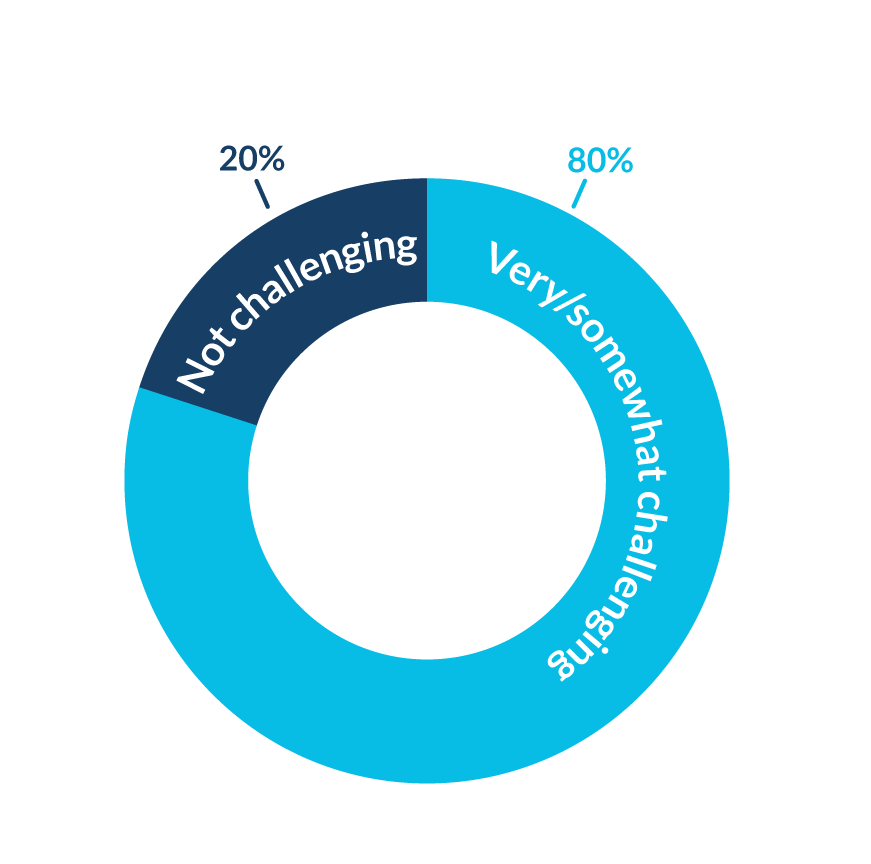
Coordinating all of the puzzle pieces on a construction project requires processes that support open, transparent communication and a high degree of collaboration. Those processes are required both between contractors, subs, and suppliers on a project, and between the field workers and back office staff.
Unfortunately, poor planning and coordination is causing the process to break down – costing construction businesses time, money, and reputation.
Poor jobsite coordination delays projects & payment
A construction project is a delicate balance of work sequences, many closely dependent on the ones before it. Any number of outside forces can interrupt the flow of work, from inclement weather to illness to supply chain disruptions. 80% of construction businesses expect delays on some or all of their projects.
As one survey respondent said, “Site work coordination is the most important factor for completing the job on time and under budget.”
“Site work coordination is the most important factor for completing the job on time and under budget.”
Survey respondent
However, survey answers reveal that most of the time, delays on a construction project are entirely preventable. Communication and coordination between the general contractor, subcontractors, and suppliers is notoriously difficult.
Nearly 70% of contractors surveyed said that poor jobsite coordination often causes projects to run over budget or past deadlines. Over half of contractors (54%) blame delays on poor coordination between subcontractors.

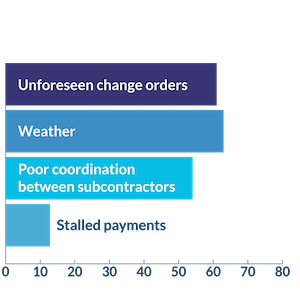
According to one survey respondent, “Jobsite coordination all depends on the GC and other subs’ schedules in our line of work.” Another agreed, saying “the timing of subs is critical” to finishing their own job on time.
On a construction project, another contractor’s delay can have a direct effect on your own productivity. In the survey, 40% of contractors say that poor coordination on the jobsite is holding them back from getting their work done more quickly.

The high cost of poor coordination: Wasted time & money
The survey data put a spotlight on three costly mistakes that eat into the profits of the respondent’s companies, and the construction industry as a whole: wasted time, lost money, and lower reputation.
Wasted time
Construction businesses are losing more than 1 full day of work every week to inefficiency. Two-thirds (66%) spend more than a quarter of their work hours waiting for work to be done.
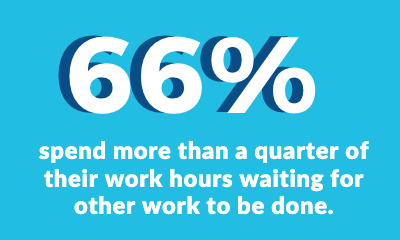
These hours and days add up over the year, and can eat into cash reserves. Paying workers to wait or spending time coordinating working hours with their teams only adds to a contractor’s cash burden.
The lack of jobsite coordination and efficiency ends up preventing contractors from doing the work they were built to do.
Nearly 75% of respondents say that their company spends less than half of their time doing actual construction work.
And 85% report spending more than 1/4 of their time tracking & reporting on project progress.
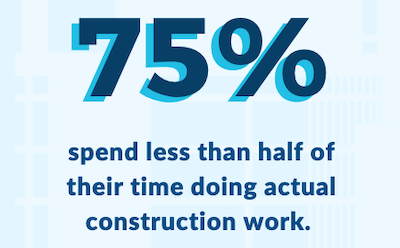
In free form responses, many survey respondents stressed the importance of good planning to limit wasted time on the job.
According to one contractor, the most important factors for getting the job done on time and under budget are “weather…and the amount of proactive planning we’ve done.”
Loss of money
In an industry with razor thin margins, efficiency is critical to the bottom line. Wasted energy leads to higher costs and lower profit.
Nearly 60% of construction businesses say that failing to complete a project on time and under budget results in lower payment for their work.
When survey respondents were asked about the factors most critical to getting paid on time, planning and coordination came out on top. “Meeting timelines,” said one. “Passing building inspections,” said another. “Timelines and details.” “Doing it right the first time.”
Loss of reputation
Reputation and relationships are everything in the construction business. As one contractor said, “Our reputation is the most important reason for consistently coming in under budget and ahead of schedule.”
GC’s and owners want to make payments and keep the work moving forward, and subs want to do great work and get hired on more jobs in the future.

In the survey, more than half of construction businesses (55%) say that failing to complete a project on time and under budget damages their reputation.
It’s common knowledge that construction projects rarely go exactly as planned. Change orders, bad weather, failed or delayed inspections and other slowdowns throw a wrench into best laid plans. Every project manager has a threshold for how much delay is acceptable.
Proper planning, resource allocation, and communication on a job is paramount for contractors to ensure their work stays under that threshold. Jobsite efficiency is critical to maintain relationships, and protect a business’ reputation.
Construction’s Vicious Cycle: Late payments and low productivity
The survey reveals that problems with efficiency in the field often leads to payment reductions and delays. In turn, slow payments cause cash flow problems that reduce a construction business’ ability to finish work quickly, effectively stunting the growth of their business.
For contractors, the cycle of jobsite efficiency and payment can either boost their ability to thrive – or drive their business to the edge of extinction. According to the survey, a significant number of construction businesses are caught up in a vicious cycle of late, partial payments and limited productivity.
Contractors are getting short changed and paid late
Cash is critical to the success of every construction business. After all, this is an industry with big up front costs, complicated billing procedures, and narrow profit margins.
“Cash flow is huge for a small business like mine,” said one contractor. “We require money up front for special orders and to pay subs on time.”

Fewer contractors than ever are getting paid what they agreed upon.
Only 52% of construction businesses say they “always” get paid in full and never have to deal with back charges, deductions, or other withholdings.
(Non-payment is a construction trend that’s only getting worse – that number dropped from the 62% who reported being paid in full in the 2019 National Construction Payments Survey.)
To add insult to injury, contractors also get paid late. Only 26% say they “always” get paid on time according to their contract.
Late payments can lead to even longer delays.
“The ability to purchase and pay on time is critical,” said one contractor. “When cash flow is slow, we cannot move forward on a project as quickly as we would like.”
Yet, as we’ll see, in spite of the toll that late payments take on construction businesses, too many contractors afraid to take action that would help them get paid faster.

Getting paid in construction takes a lot of time & effort
Only about half of businesses (52%) say they often receive payment within 30 days of invoicing. In fact, 1 in 6 businesses typically wait 60 days or longer after invoicing to get paid.
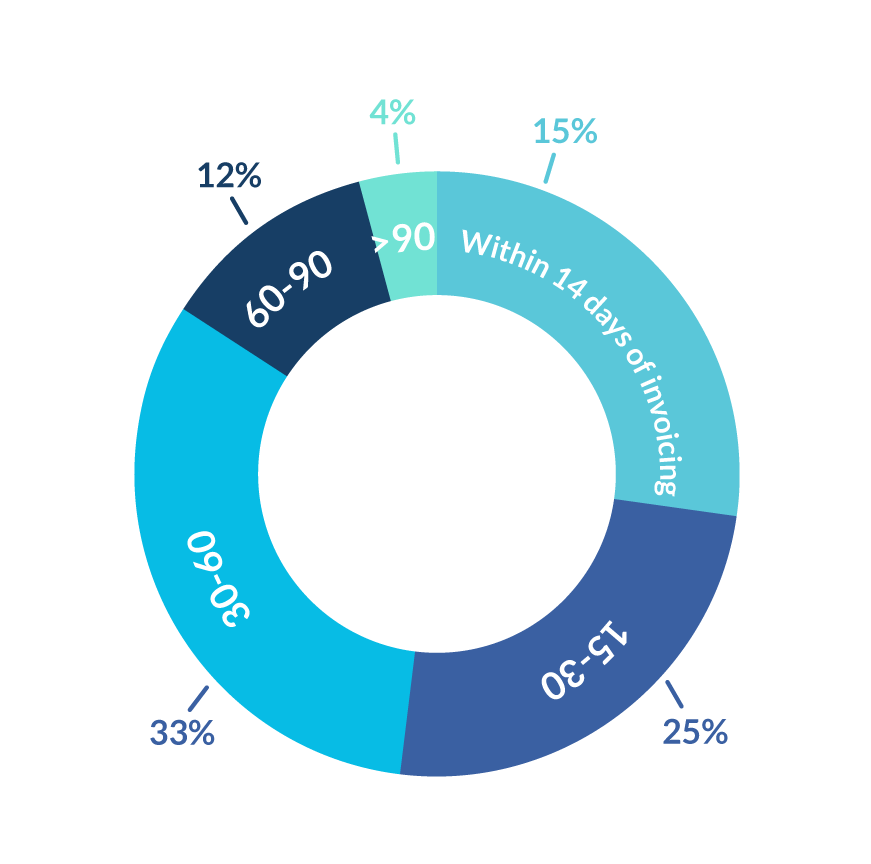
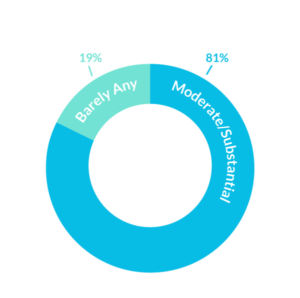
The most common reasons for late payments? Waiting for payment from the owner (54%), incorrect work (26%), and missing invoices (23%).
Inefficiencies in the field don’t just delay project deadlines. They also create problems for the back office. More than 1 in 3 contractors say that payments are “often delayed” because of a dispute over the quality of work.
Payment delays come with a high cost for construction businesses. Over 80% of companies say they spend a “moderate” or “substantial” amount of time chasing down payments.
“I spend half of my time chasing down money on projects,” one survey respondent said. “This prohibits me from managing existing projects, securing new projects, and maintaining relationships with clients, employees, bankers and future prospects.”
Cash flow problems limit productivity and growth
When payments to contractors and suppliers are late and not in full, it puts an enormous strain on their ability to get business done.
“Cash flows have a huge impact on the operation of our business,” said one contractor. “The ability to purchase and pay on time is critical. There are times when cash flow is slow and we cannot move forward on a project as quickly as we would like.”
Late payments also keep construction businesses from growing. As one contractor said, “Cash flow issues prevent us from taking on larger jobs. We have to get progress payments just to operate on the job.”
For some, the cash flow problems caused by partial or late payments are even more dire. “I live paycheck to paycheck,” said one survey respondent.

The construction industry is numb to poor jobsite coordination & late payments
Just over half (53%) of all respondents said they are happy with how quickly they get paid. At the same time, over 80% of companies say they spend a “moderate” or “substantial” amount of time chasing down payments.
Construction suffers from slower payments than almost any other industry
Collecting payment in construction takes longer than almost any other industry. In 2019, the average “days sales outstanding” (DSO) was a whopping 83 days. That means that the average construction business is waiting nearly 3 months to collect on their invoices.
But why does it take so long to get paid in construction? It’s doubtful that construction businesses are happy spending so much time, energy, and money trying to get paid. As it turns out, many contractors and suppliers are actually making the problem worse.
Many construction companies act like poorly run banks
Perhaps unknowingly, a lot of construction businesses are actually training their customers to delay their payments.
Nearly half of construction businesses offer their customers payment terms of 30 days or longer.
And 8% actually offer terms of longer than 45 days!
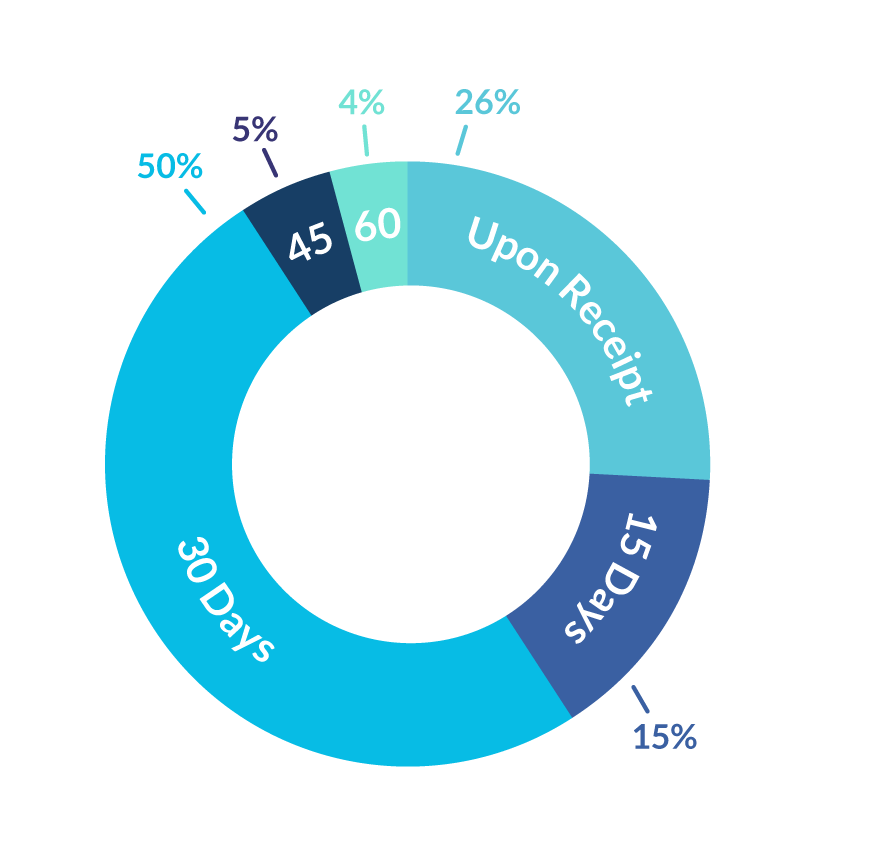
At the same time, businesses are ignoring how much money it actually costs them to fund their customers’ business. In effect, the majority of construction businesses are happy providing an interest-free loan to their customers, without any penalty for delay or incentive for faster payment.
Almost 70% say they “rarely or never” charge interest on overdue invoices. And more than half (54%) never offer discounts for early payment.

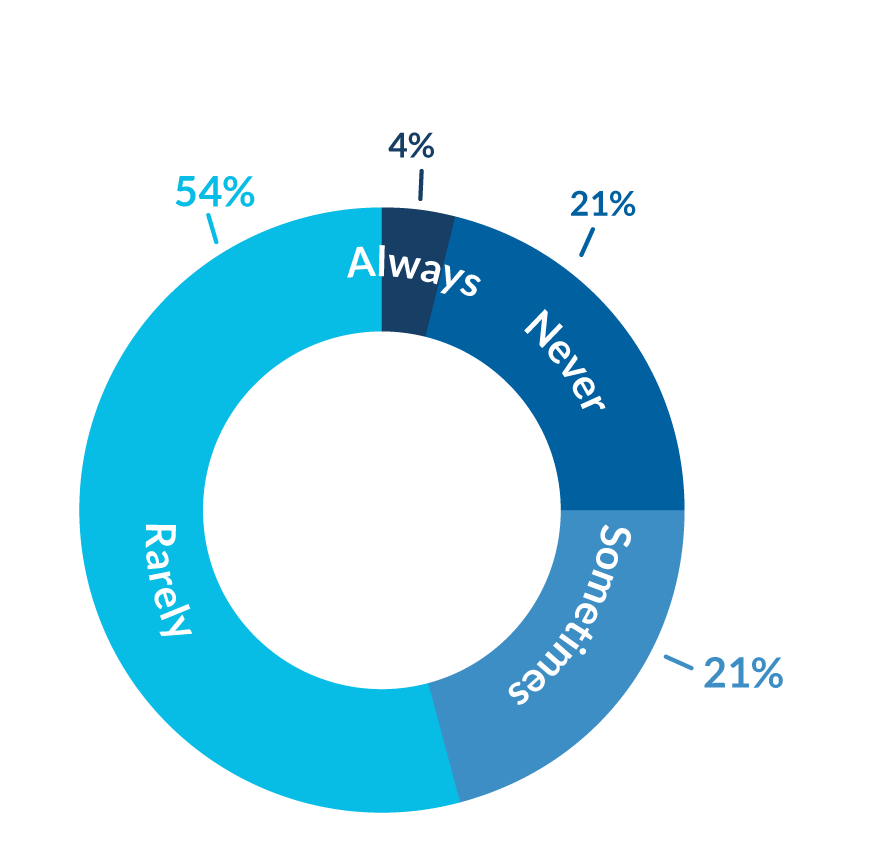
But why? If credit card companies stopped charging interest, and let their customers pay them back at their leisure, they wouldn’t stay in business for very long.
Of course, not everyone in the industry is happy giving away free money. According to one survey respondent, “My motto is: I am NOT my clients’ banker. All payments need to be paid when requested.”
Contractors are afraid to protect their payments
A construction business’ right to file a mechanics lien over unpaid work is enshrined in the laws of every state. Yet it’s a right that few contractors take advantage of – even when they are getting crushed by late or missing payments.
While every state has their own process to protect lien rights, the requirements often include sending preliminary notice and/or a notice of intent (NOI). Yet nearly 40% of construction businesses say they “rarely or never” protect their lien rights on a project. Only 11% protect their mechanics lien rights on every project.

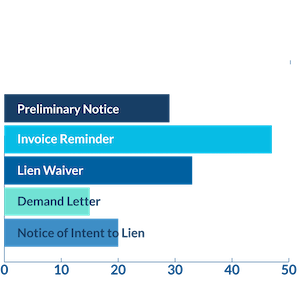
Of course, no one expects to have a payment problem when they start a construction project. But even when a payment dispute arises, few contractors or suppliers actually take the steps that virtually guarantee that they will get paid. Nearly 2/3 of construction businesses say they “rarely” or “never” file a mechanics lien if they’re not paid in full.
So why are contractors and suppliers so reluctant to use the tools that their state gives them to protect their payment? Ultimately, it comes down to fear.
Almost 1 in 3 say the fear of losing a customer keeps them from filing a mechanics lien. A third of construction companies would rather protect their relationship with a non-paying customer than protect their money. The money that enables them to pay their workers, suppliers, bills – and stay in business.
The construction industry is slow to adopt technology that would help
In some ways, the construction industry is firmly in the 21st century. Equipment and building tools are more advanced than ever. Contractors are creating smart buildings, integrating state-of-the-art materials and technology that save energy or allow users to control and monitor the structure’s systems in real time.
Yet many construction businesses themselves are still stuck in 20th century processes, using paper to prepare reports, paper to document their work, and paper checks to send or receive payment.
Compared to software solutions that can provide real-time updates, seamless communication, and instant document exchange, paper processes are incredibly slow, highly prone to error, and susceptible to loss or damage.
Only about half of construction businesses (53%) use some kind of digital application to manage tasks or coordinate field work in real-time. And fewer than 1 in 3 use software to organize, send, and track payments or paperwork. Perhaps most surprisingly, 20% don’t use any construction software at all.
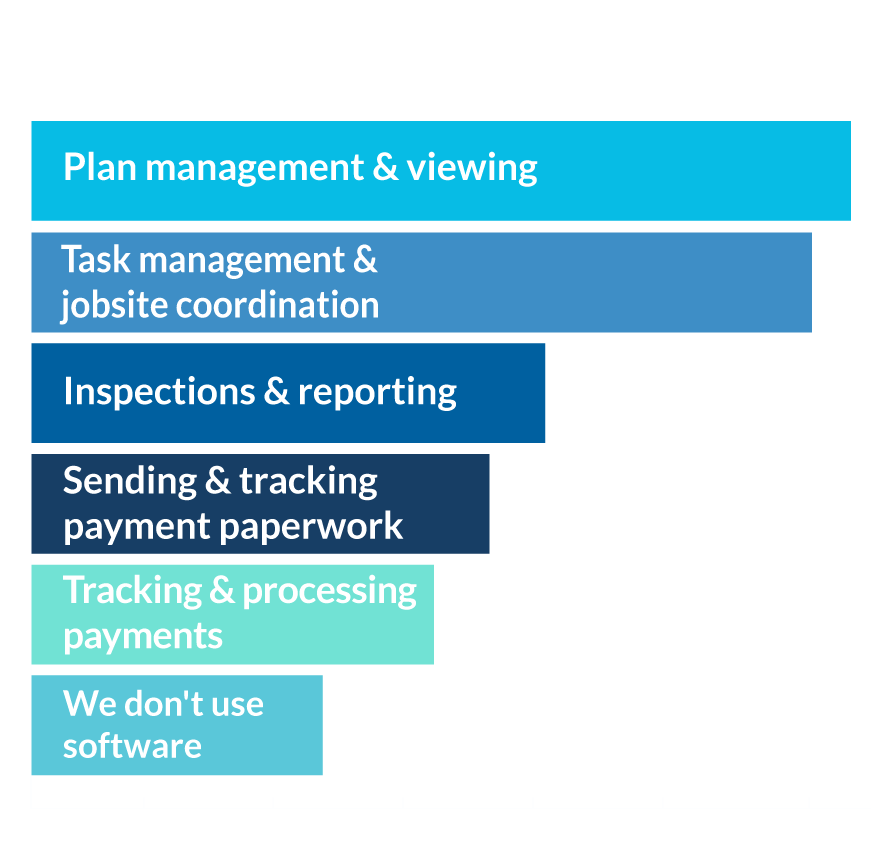
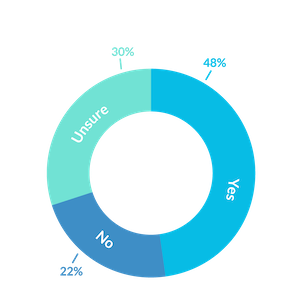
The low rate of technology adoption ends up costing everybody on the job. 20% of survey respondents said the lack of construction technology is holding them back at work. Nearly 25% of construction companies list missing invoices or pay applications among the most common reasons for late payments.
COVID-19 is exposing the construction industry’s weaknesses
We conducted this survey in Q1 of 2020. That was prior to the COVID-19 outbreak, when confidence in the construction market was at an all-time high. It’s possible that, buoyed by an optimistic economic outlook, contractors and suppliers had an excuse to neglect jobsite and payment processes that were holding them back.

In good times, when there’s no shortage of projects to choose from, you may be able to get away with a missed payment or less-than-ideal productivity on the jobsite. The coronavirus has dramatically changed that scenario. Construction businesses are desperate for every dollar they can get.
In the foreseeable future, good planning, coordination, and accounts receivable management aren’t just critical for a contractor’s success – they are a matter of survival.
Coronavirus delays are mounting on construction projects
The current pandemic has fundamentally transformed the landscape. Construction projects across the country are shutting down or experiencing lengthy delays. The industry is already seeing massive shipping delays on materials from China; a situation that experts expect to worsen in the coming weeks and months.
According to the AssociatedGeneral Contractors (AGC), 40% of construction businesses nationwide are reporting layoffs. Workers are getting sick, or reluctant to come to work over fears of infection. In the midst of mounting delays, contractors are running out of cash and struggling to keep their doors open.
Social distancing & lack of technology is affecting jobsite productivity

Construction’s resistance to jobsite technology is killing productivity during the downturn. Social distancing measures and health measures are making field teams less efficient and productive on their own. But construction businesses that lack the tools to manage projects remotely are at an even bigger disadvantage.
Layoffs and a sick workforce mean less manpower to get the job done. Companies who haven’t already implemented communication or coordination construction technology are at a major disadvantage when it comes to managing work on the jobsite.
Coronavirus makes it harder for contractors to get paid
Every construction company is holding onto their cash, delaying payments as long as they can. For businesses reluctant to adopt payment software, COVID-19 has made collecting payment especially difficult.
Compounding the basic cash flow problem, back office staff lack the processes to protect and ensure payment on every job. Even in cities that allow construction to continue, credit managers and other office staff are working remotely without access to the tools they need to manage the payment process.
Sending notices, pay applications, lien waivers, and other payment documents on time is essential to getting paid in construction. Yet the finance and accounting teams responsible for exchanging payment documents are suddenly working from home.
Without technology to track project milestones in real-time or file documents remotely, construction companies are at high risk of missing deadlines and losing their payment protection entirely.
Mechanics lien filings are growing
The 65% of construction businesses that say they “rarely” or “never” file a mechanics lien over non-payment? They don’t have the luxury of ignoring their lien rights anymore. In the midst of a recession, a single missed or delayed payment could spell disaster.

Across the country, lien filings are at an all-time high. Across in the US in March 2020, construction businesses filed 40% more mechanics liens than in January according to Levelset’s lien monitoring data.
And that number is likely to skyrocket. Construction delays will get longer and more contractors will start hitting their state’s filing deadlines for work performed in Q1.
As delays increase, everyone in the construction industry is rushing to collect on every dollar in their accounts receivable. Filing a mechanics lien to put your business at the front of the payment line is a top priority right now.
Construction businesses need better planning, faster payment, and new processes to survive
Dodge Data & Analytics is predicting a quick rebound for the construction industry. Even if the best-case scenario does occur, the construction landscape has fundamentally changed. The construction businesses that emerge on the other side of the COVID-19 pandemic intact will need to adapt to survive. We will likely be living under the threat of the next coronavirus for years to come.
The results of the 2020 National Construction Payments Survey show a clear gap between expectations and reality in the construction industry. Contractors and suppliers say they have a high degree of satisfaction with productivity and payment. At the same time, they overwhelmingly report a lack of planning before a project, headaches and wasted time caused by poor coordination on the jobsite, and slow payments that limit their ability to grow.
Now more than ever, construction businesses need to focus on planning for better jobsite coordination – and get serious about protecting every payment that they earn. The ones that can adopt processes that make them more productive – and get them paid faster – will be set to thrive in the post-coronavirus economy.
